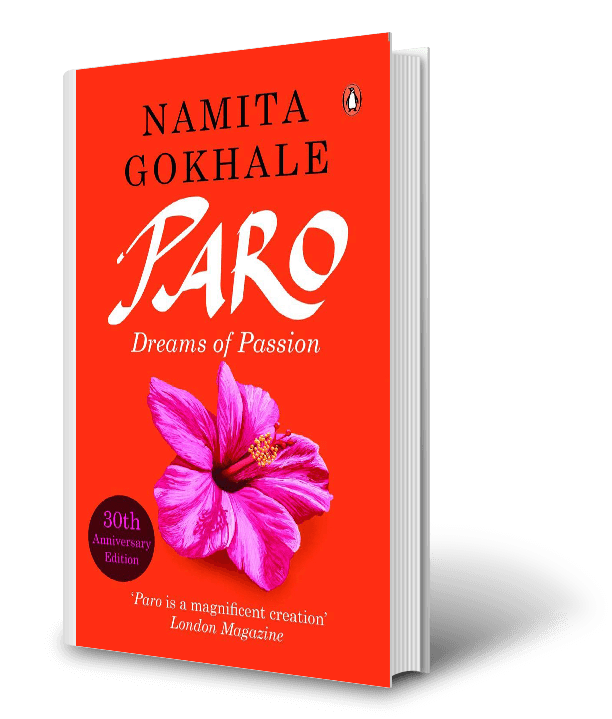
Paro: Dreams of Passion
Paro is a heroic temptress, alluring and rapacious, the stuff of legend. As she wanders through the private world of privilege and scotch whisky that the urban rich inhabit, she is constantly observed by the acid Priya, eternal voyeur and diarist… This is a dazzling moral tale, sharp, sexy and funny.
In the Media
We have come to rely on a gimlet-eyed European, Ruth Prawer Jhabvala, for social satire on urban Indian woman in the throes of emancipation, but Namita Gokhale, author of Paro, hails auspiciously from Lucknow, once the cultural capital of Mogul India, and her first novel holds a nice promise of polished barbs.
Although she sinks her teeth into Indian society, the promise is not quite sustained as yet because of a lack of subtlety in thumping home the disenchantment (failure of the air-conditioning, a jellyfish sting, all at moments critiques) and transforming a racy start into a kind of Dies Irae with a drastic jolt.
After seventh heaven in the arms of her pudgy boss B.R, proprietor of Sita Sewing Machines, Inc. love’s young dream of his secretary Priya, her head stuffed with Mills and Boon, is rudely shattered when he marries the gorgeous, insufferable Paro.
The relationship between the two women (jealous loathing tinged with grudging admiration and the occasional fantasy of exchanged identities on Priya’s part) Paro’s insatiable amours and Priya’s arranged marriage to an oily Delhi lawyer and her three later sad misfires with B. R., provide change of scene and a representative medley of characters like the buck-toothed cricketing princeling, the big Congress wheel, the drop-out scion of a (useful) Minister of State.
Ms. Gokhale finds nothing to the credit of this grasshopper society and hurries its symbolic nemesis, along with a drunken suicide and a bribe extorted by ghouls in the burning ghats.
One of’ the epidemics which decimated the Indians of southern Patagonia was caused by sonic contaminated wastepaper. As a result the tribe held a deep suspicion of’ the written word. This suspicion, I often find in reading my week’s batch of fiction, is not necessarily confined to the Indians. How refreshing then to come upon a first novel such as Paro.
Namita Gokhale is only 27 hut her highly-flavoured tale of’ the passions and jealousies of a group of middle-class Indians is observed with the assurance and the subtlety of an extremely seasoned writer. Priya, the narrator, is an ordinary, plaint girl from Bombay who sees herself as an “unmoved voyeur” (even when kissing the love of her life – a flabby manufacturer of sewing machines known only as BR – she is “detachedly clinical’). For the hulk of the novel she casts her kohled eye on Paro, a self-dramatizing beauty with crinkling- green eyes, an arrogance “without portfolio, and a scorpion wit. Always exuding “the civet smell of recent sexual activity”, Paro inspires in the men she meets something between a leer and a salute. Though Priya never convinces the reader of her professed love for Paro, it is clear she loves – to the point of obsession – what the woman gets up to, first with BR whom she marries, then with everyone from a buck- toothed cricketer to a homosexual film director.
Like its narrator, Priya’s account of’ Paro’s rise and fall is instinctively honest, intelligent and undemanding. My criticism of this otherwise compelling debut is that Priya’s participation in the saga is too vicarious, her stance too distant. The profundity of her avowed affection for BR, whom she intermittently humps into on his whistle-stop tour of the female sex is not communicated, nor is the pain when Paro pulls out lumps of her hair “like an avenging fury” on finding she has written a book about her. In fact, the author is so detached that she almost loses control of her story so that its structure, determined by Paro’s growing obesity and eventual death, begins to take on the shape of her cleavage, which is constantly wobbling out of its sari.
By Keki N. Daruwalla
I think it is typical of us as a people that the first thing I heard of Namita Gokhle’s novel was that it was ‘pornographic’. Someone had read through the extracts of the novel and had come to this profound judgement. Since I do not read this magazine—its Editor and I do not think much of each other—I had missed out on the extracts. Hence one Saturday afternoon, as I climbed up three flights of stairs, and someone took the book out furtively from a drawer and asked whether I would care to review it in thirty six hours flat, I had my reservations. I wasn’t (and still am not!) a connoisseur of this kindof stuff. Suppose it turned out to be ‘more corn than soft porn’, as a reviewer described Kamala Das’s My Story?
It turned out to be neither. Instead it made for compulsive reading mainly due to its fast moving narrative, quick changes of scene, with new characters coming in till the last, and a style that was subtle, controlled and honed to a purpose.
I am not sure the central character in the book is Paro. She is too melodramatic, too overbearing for my liking. Success, or what passes for it inour middle class mores, came too easily to her, whether it meant being married to B.R., the lascivious honcho of the Sita Sewing Machine Company or the homosexual Helene towards the end. Instead one instantly warmed to Priya, the protagonist. Priya overcame her lower middle class origins, yet till the end, retains some shred self respect, some individuality. Hers is perhaps the only character that really grows.
Priya starts with an adolescent crush for her boss, the great B.R. The first time she visits B.R., she is spellbound by the opulence and the quietude. ‘The azure carpeting, the dazzling white of the walls, the Ajanta fresco painted on the drawing room wall, all held me in incredulous thrall.’ And to the resonances of Stravinsky’s ‘Rites of Spring’, he takes her. “A strange beatification, a feeling of utter lassitude, overtook me. I forgot that my nails were as chewed and bitten as a school girl’s pencils, and that my sandals had gaping mouths in them. I felt beautiful. And beloved. He undid my plait and let it lie loose about my shoulders. His soft white hands caressed my neck. His fingers were long and slim. Perfect half- moons rose mystically from each cuticle. I was mesmerized by his presence and the music. His hand slid softly down the front of my blouse and began stroking my breast. I pretended to be lost in the music as not to have noticed.”
But within a month, to Priya’s utter chagrin, B.R. marries Paro, aggressive, audacious, a Brigadier’s daughter from Delhi. “Hi Dadyji” she says to her horny father-in-law (like son, like father!) planting a kiss on his forehead as she walks into the book on impossibly high stiletto heels, her payals encrusted with real looking diamonds, her lipstick a pale silver, and her silver eye shadow gleaming over her hard eyes.. A bit overdone this, especially the diamonds on the payal bit, but then Paro is larger than life. So are her breasts, and her passions and whims and rages. And her death wish is larger than death.
Priya herself gets married to a lacklustre small time lawyer from Delhi, Suresh. They start networking on contacts and cultivating ‘superiors’ in the legal profession by hosting regular informal get togethers. Suresh, with bluff good humour (if you could term such humour as ‘good’) starts offering himself as joker, buffoon and spittoon to his “social and economic superiors”. Later Paro, now a massive-breasted divorcee, descends upon Delhi. Suresh gets close to her since Avinendra, or Lenin as he is known to friends, the minister’s Marxist son, is hung up on her. Priya has another brief fling with B.R. during a holiday in Bombay, straining her relations both with Paro and Suresh. (Moot point—does B.R. have any resemblance with JR of the Dallas soap?)
It would be pointless going through their endless quarrels and the different permutations and combinations in bed. The plot is not complex but a linear, sometimes simplistic narration of events. One wishes for more flashes of insight into character. But Namita Gokhle has an eye for scenes, a flair for the dramatic confrontation. Apart from the stereotyped ones, like the politician’s wife visiting the mistress (who but the inevitable Paro?) and beating her up with a broom, there is the uncommon kind. For instance, when Paro throws a party at her Jorbagh barsati after Lenin has won a five lakh, a gate crasher appears on the scene, eyeing her with unconcealed lust. This is the famous politician, Shambhu Nath Mishra, “an eminence grise, a sinister minister”, “black as the night”, his belly protruding “obscenely from his chest like a fat rotting pear.”
“I am Paro and this is my party. And who may you be?” asks Paro.
“My party is the Congress Party—and I have come here to see Avinendra, to congratulate him.”
Within an hour they are in bed together, Paro and the politician. Why is she so taken in by Mishra? She is asked later.
“He is so ugly, so repulsive that he makes me feel beautiful.” Psychological insights are on this level in the book.
Priya’s fixation for Paro is much more subtle. It is almost pathogenic. She gets an abortion after getting Paro’s gift, an oblong metal bronze etching of a screaming woman, her eyes glazed with terror, and a totemic owl to boot. Priya is her chronicler and her diarist. Anyone cast in that role cannot escape being a voyeur. Somewhere, almost subconsciously, admiration for the convention breaker from this rep from the hide-bound middle classes, emerges. When the chronicle is actually discovered, the middle class terrors get exposed. When it comes to the crunch, Priya does not flinch from speaking out the truth, however self-incriminating.
The style is racy and holds you. It seems almost petty to cavil at its minor flaws. Firstly the Indianizations: “The pathetic spectacle of my husband, a grown up man, a professional chamchaing and maskalagaoing a callow youth whose voice has not only cracked properly.” There are some other instances of careless writing. Lenin is referred toas “a sort of an oriental Jesus Christ.” Jesus was oriental—Galilean if ever there was one.
Again Priya discovers a liaison when the girl comes looking for her golden payals in B.R.’s room, after, presumably, a bout with him. All one wants to say is that it is not payals a woman takes off in this kind of activity.
One hopes the novel will be eventually remembered less for its sexual explicitness and more for the easy flow of narrative and some memorably dramatic scenes. Those looking for some elaborate metaphor running through the book, or something profound or some luminous epiphanies may be in for a disappointment. A book sets its own terms, defines its own penumbral ambience. (Moreover this is a first book by a young and very talented author). Paro deals with the rich and their frenetic lives, their servility to politicians, their affairs, their copulations and their suicidal urges. We need not put too fine a point on it by questioning the ‘authenticity’ of the picture drawn. Do the rich in Delhi or Bombay really behave like that? We have to take the author’s word for it that they do. ( In any case, there is no ISI mark for authenticity.) Trapped in this milieau are Suresh and Priya. Her adolescent fixation for B.R. reaches out for her from the underbrush of her past. A miscarriage stalemates any chances of a future worth living for. Eventually the present turns into a limbo between an impoverished past and an aborted future.



